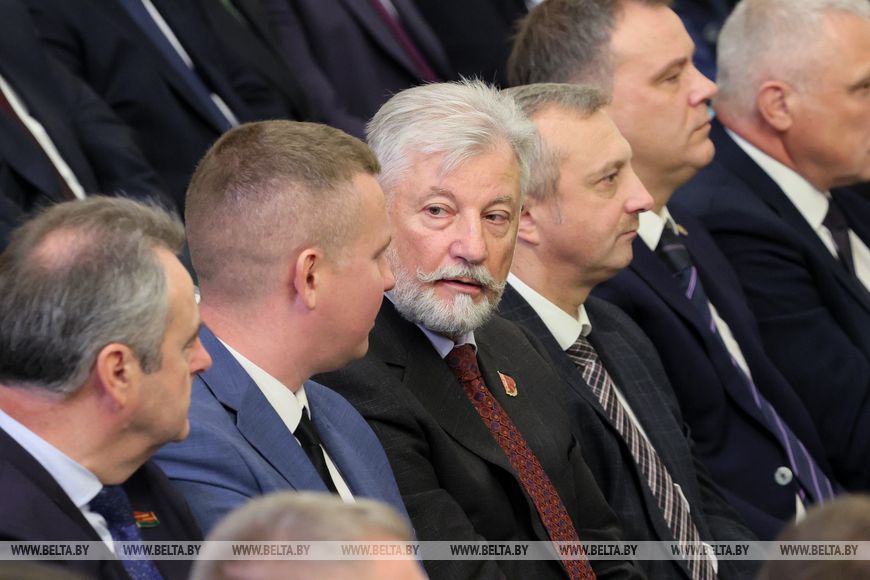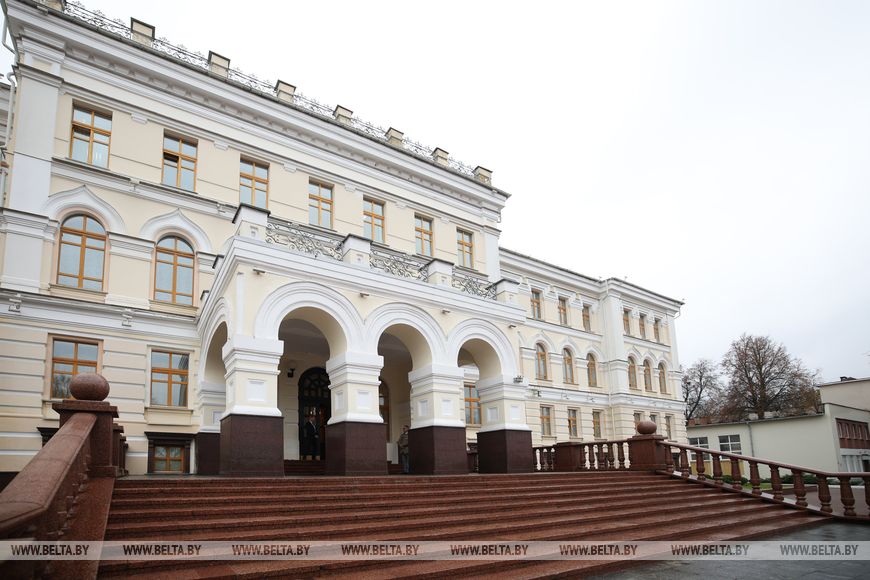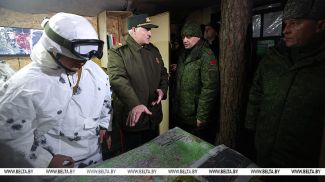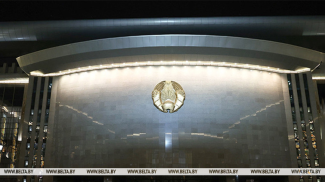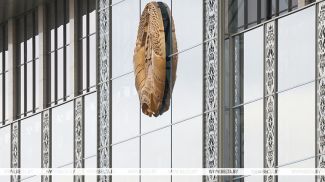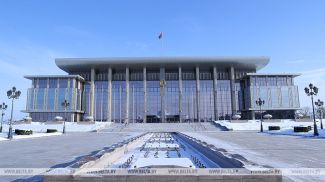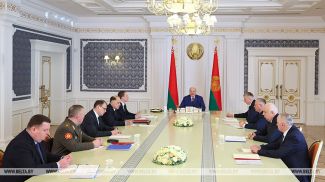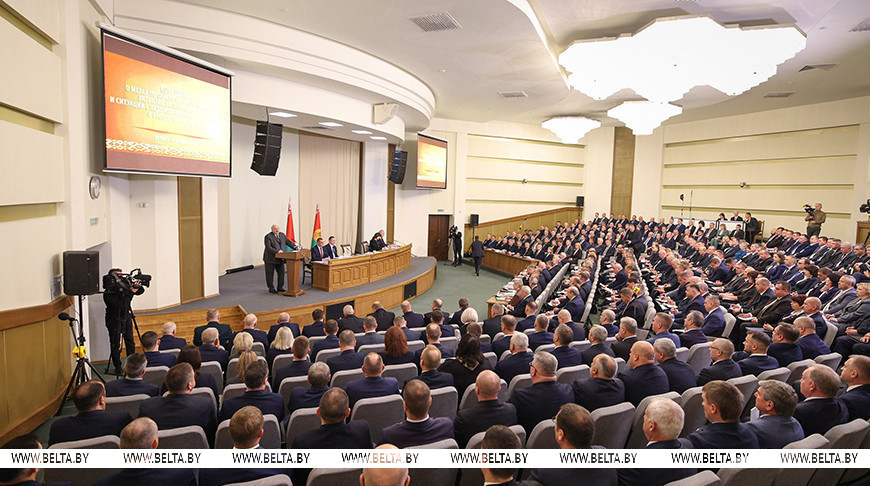
VITEBSK, 24 October (BelTA) – A clear and actionable plan for the genuine revival of Vitebsk Oblast is imperative, Belarusian President Aleksandr Lukashenko said during a conference in Vitebsk, BelTA has learned.
“We cannot allow this region to stagnate and simply stand by as negative trends intensify. I will take all necessary measures to compel effective work; no excuses will be tolerated,” the president warned. “There will be no stagnation. I will not idly observe these deteriorating conditions.”
He pointed out that in several key production sectors, the region’s lag behind Brest, Grodno, and Minsk Oblast is reaching a critical point. “But the most dangerous trend of all is that you are simply losing people!” stated Aleksandr Lukashenko.
Citing concrete figures, he noted that In January-August the number of employed individuals in the economy fell by 3,500 year-on-year. This number shrank by 4,200 in 2024, and by 8,500 in 2023. “Yet, I remain convinced that our northern region has everything in place for accelerated progress: a favorable transit location, a diversified industrial complex, a developed educational base, and strong traditions,” the president asserted.
“The people here have long been waiting if not for a breakthrough, then at the very least for a coherent and actionable plan for the real revival of Vitebsk Oblast. And together, we will deliver it,” the Belarusian leader concluded.
Aleksandr Lukashenko recalled that over the past 15 years numerous initiatives had been launched in Vitebsk Oblast: the Clean Fields campaign and the VitAgro program by Aleksandr Kosinets (former Vitebsk Oblast Governor, 2008-2014), the Orsha “offshore” project and integration associations in the agro-industrial complex by Nikolai Sherstnev (former Vitebsk Oblast Governor, 2014-2021).
Vitebsk Oblast Governor Aleksandr Subbotin has been in office for four years. “A full Olympic cycle, in sporting terms. This is more than enough time to demonstrate management skills and achieve results,” the head of state noted. “It is time to take stock of the results of Vitebsk Oblast’s development, identify systemic shortcomings, and develop solutions that will help the region dramatically improve the situation in its problem areas.”
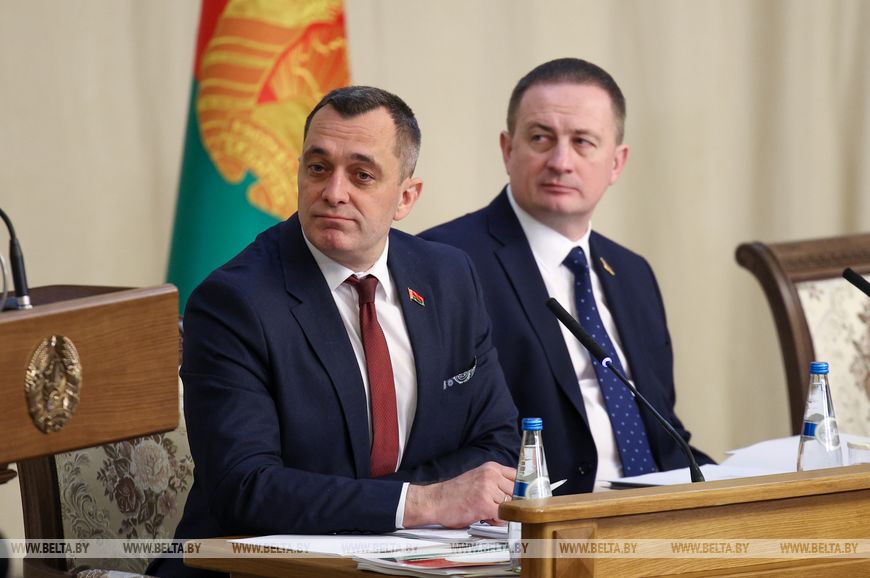
On the region’s achievements and the president’s reservations
“Naturally, I am far from believing that absolutely everything here is bad. I have started with the shortcomings because this is the very reason we have gathered. We are not here to do back-patting,” the president remarked.
Experts briefed him on several positive developments, such as the current growth in household incomes. However, Aleksandr Lukashenko pointed out that this growth does not align with the region’s declining production. “Is that not a problem? People’s incomes are rising, yet Vitebsk Oblast itself is struggling,” he observed.
Another positive is the increase in exports for certain goods. “That is not bad, but this pertains only to certain items. Exports as a whole represent a very serious challenge for us at present,” the head of state noted.
Housing availability in Vitebsk Oblast exceeds the national average, with over 30 square meters per person. “But what kind of achievement is that? If you work poorly, yet your housing and salary are more or less okay, it simply does not align,” the Belarusian leader commented.
The president did recognize some progress: during the current five-year period, 103 production and investment projects worth over Br2 billion have been implemented in the region. Sectors such as pharmaceuticals – where unique production facilities are being built – along with electrical equipment manufacturing and petrochemicals, are showing active development.
On examples of ‘improvisation’ and the lack of economic sustainability
The head of state also pointed out many negative aspects and shortcomings in the region's development. For instance, the potential of the forestry sector and tourism is unlikely to be utilized even at 20%. And this should be the main source of income for the region.
Aleksandr Lukashenko noted that even in Arab partner countries of Belarus, there is an interest in visiting Belarus for tourism, to spend some time in its forests and by its lakes. He gave the example of the Emirates, where a significant income now comes not from oil, but from tourism. Vitebsk Oblast has potential in this regard, the Belarusian leader stressed.
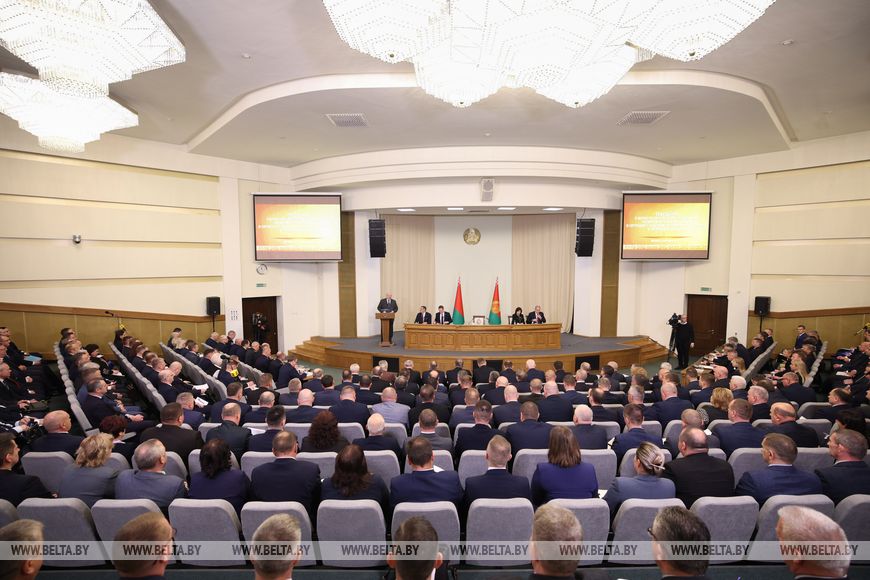
“A fresh example of your ‘improvisation’: had it not been for Oman's interest in building a second pulp mill in Belarus, choosing a location in Vitebsk Oblast, you would have remained the only region in the country without major wood processing industries,” the president said.
In his words, following the so-called modernization of Kosinets-Semashko, the last enterprise of Vitebskdrev was shut down in February 2025 with substantial debts. The Postavy furniture center isn't exactly taking off either. “The result is that, for all its woodlands, the region has lost all its specialized capabilities and been reduced to a supplier of raw materials for other regions. Assuming it wasn't already in that role,” the head of state stated.
“These examples indicate that there is no sustainability in the region's economy. If people are leaving, as I mentioned earlier, it means the wage levels and number of competitive jobs are insufficient. You have completely failed to manage the workforce,” Aleksandr Lukashenko said. “You know everything, you can do everything. You are simply irresponsible people. You need to sort out the situation with personnel in every single enterprise.”
On state support and thoughts that should be left behind
“Over the past four years, organizations in the region have used state support 1,285 times! In fact, funds were allocated from the budget every day. Therefore, it is not true that no one has heard your request or helped you,” the head of state stated.
“That is why it is a colossal mistake to think that the president has come and will once again ‘write off’ debts. I would like to repeat to everyone in this hall, from enterprise heads to government officials: you should leave such thoughts behind,” Aleksandr Lukashenko warned.
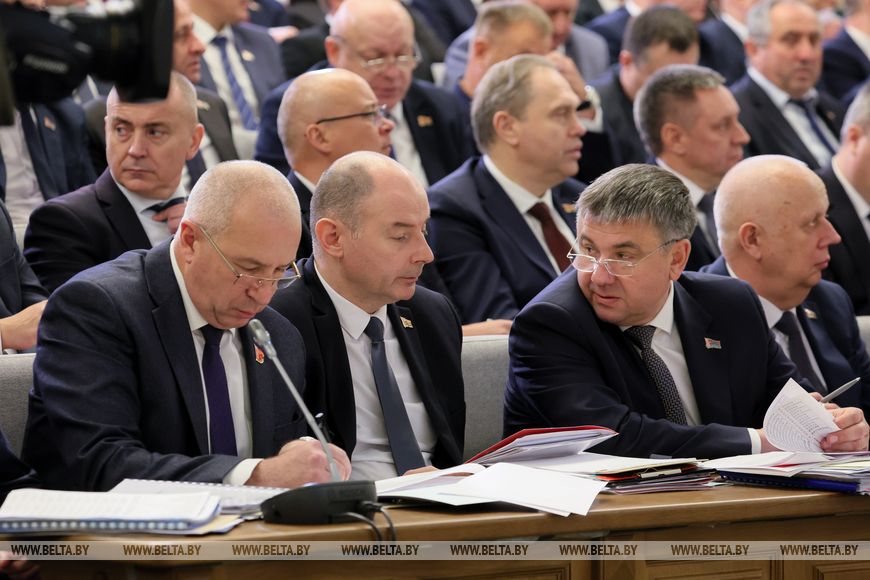
He emphasized that this is not his personal money, but the money of all Belarusian people, which had been allocated to Vitebsk Oblast under specific commitments and to help achieve concrete results. “A doctor from Gomel or a miner from Soligorsk supported you through the tax system for distributing budget revenues. Therefore, I am not writing anything off. As of today, you do not deserve any favors. The people have given me the authority to hold you fully accountable and to thoroughly examine why you squandered this support ineptly and are now coming back ‘with a begging bowl’,” the president said.
On empty promises ‘that drowned the region’
“Vitebsk Oblast simply drowned in a sea of empty promises as no action followed (I can recall the red cows in Ustye, the vaccines by BelVitUniPharm, and Orsha Meat Processing Plant),” the head of state said.
He cited a series of further negative facts. For instance, over five years, industrial output went down to 98% while the national growth was recorded at 14%. The region’s traditional sectors, including oil refining, light industry, and energy, have declined.
“Even the famous Belwest is now asking for state support (the 'effective investor' left behind Br300 million in debt),” the head of state cited as an example. “Across the road is Marko. It’s operating. Why not turn to them for help and advice.”
Aleksandr Lukashenko also drew attention to the situation at Orsha Linen Mill, which ‘wouldn't find firm ground under feet’ and which incorporated Baranovichi Cotton Production Association. “We will definitely take a close look at what is happening there in the near future. This year, the country has harvested 25% more flax straw (183.400 tonnes, an increase of 40,000 tonnes compared to 2024). We cannot let this harvest go to waste. This is a serious economic reserve for the linen mill, an opportunity to earn additional foreign currency and net profit,” the president said.
On the One District, One Project initiative
Aleksandr Lukashenko noted that the One District, One Project initiative will be reviewed soon. In Vitebsk Oblast, this initiative is being fulfilled in only half of the districts.
“On one hand, we are absolutely right to intensify the push for investment projects in small districts, where every job is worth its weight in gold. But on the other hand, by building a new pulp and paper mill, we risk 'stripping bare' all the surrounding areas, villages. For you, this is a serious test, namely to maintain a sensible personnel balance. Especially through housing programs,” Aleksandr Lukashenko noted. "A distortion has emerged in Vitebsk Oblast. Last year, over 40% of all state-supported apartments (houses), including rental ones, in the entire region were built in the city of Vitebsk itself. With such a housing policy, how do you plan to solve the problem of personnel shortages in other districts?”
On agro-industrial associations and the current situation in agriculture
The president separately addressed the situation in the region’s agro‑industrial complex. He recalled that, at the proposal of the regional leadership, so‑called agro-industrial associations were created on the basis of processing enterprises. In order to reduce the financial burden, debts amounting to more than Br2 billion were restructured. A strict task was set: to increase production volumes, load capacities, and use the resulting revenue to pay off deferred debts.
However, the performance of the region’s agro-industrial complex has shown a generally negative trend.
Agricultural output has decreased by 5% compared to 2020. The decline continued in 2025, with 98.1% of the previous year's level across all categories of farms in January-September.
Crop production has dropped by over 20%.
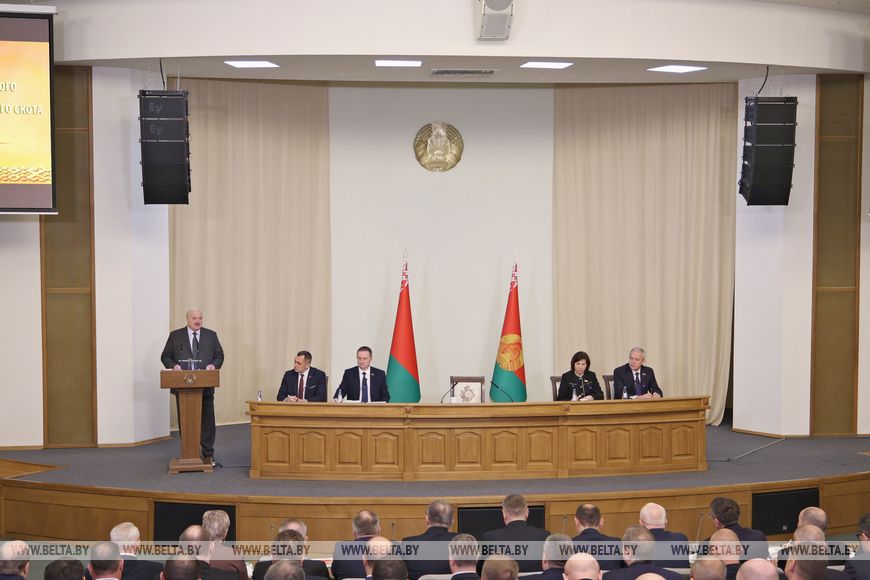
Livestock farming has seen a modest increase of 5%. The real growth has been seen only in poultry farming, and even that against a previously negative trend. Other sectors have shown declining indicators.
For example, cattle breeding decreased by 6%, mainly due to herd reduction. In Vitebsk Oblast, cattle mortality rose by 40% in January-September 2025.
Aleksandr Lukashenko also drew attention to the poor level of technical equipment in agricultural organizations, as 70% of the machinery has been in use for more than 10 years. “And even when we allocate, for example, expensive high-powered tractors, the State Control Committee and the law enforcement constantly report that they are being used inefficiently, from the layout of fields to the availability of machine operators and the condition of machinery yards,” the head of state said.
At the same time, the head of state noted that if machinery is well maintained, even a 10-year service life can be acceptable. He warned that there will be no “nonsense” in the form of indiscriminate mass deliveries of equipment.
According to the State Control Committee, the utilization rate for dairy processing enterprises in the region is just over 60% in 2025. For meat processing, the rate is less than half, at 49%. This leads to a chronic shortage of revenue, and consequently, a problem of extreme indebtedness throughout the entire chain, from farmers to processors.
“Let me remind you once again about the region’s total debt: as of 1 September it amounted to Br1.6 billion (equivalent to $500 million). Of this, nearly Br1 billion (Br950 million) must be repaid within the next five years. Can you manage that? At the current pace, no. How did we get to this situation?” the head of state asked.
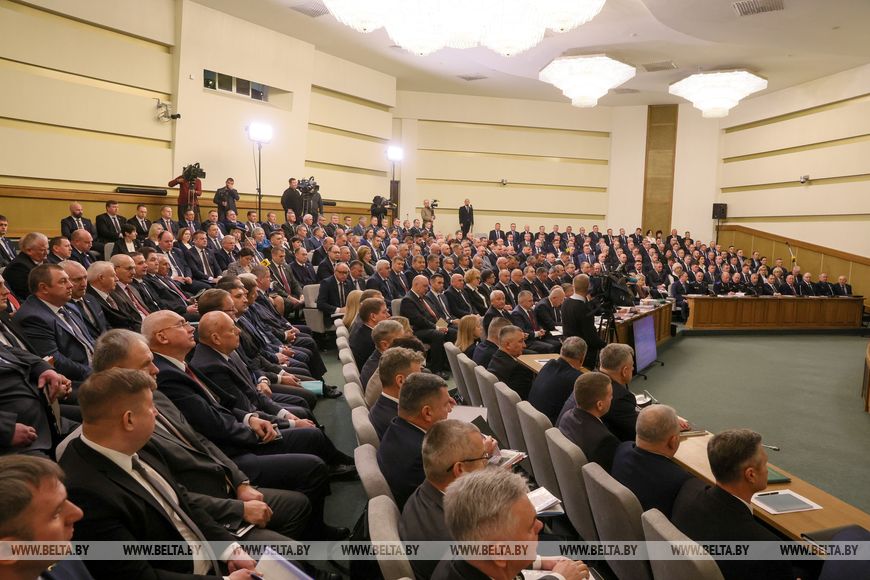
He demanded an explanation for why the expected results had not been achieved. Moreover, out of the seven agro-industrial associations created, only six are currently operating (the Moloko enterprise was merged with Polotsk Dairy Plant to prevent bankruptcy).
The president recalled that decisions to restructure the debts of Vitebsk Oblast’s agro-industrial complex had already been made twice at the level of the head of state: in 2016 and 2020. “Now you have come again and are asking for repayments to be extended until 2045, or in other words, indefinitely. Where are the results of your efforts?” the Belarusian leader asked.
The president drew attention to some serious cases of mismanagement and neglect: “I am beginning to suspect outright sabotage. Could it be that the leadership of the regional executive committee has lost control over the region? Or could there be irreversible processes happening in the region that require outside intervention, including from law enforcement agencies?”
With regard to rural areas, Aleksandr Lukashenko cautioned against further hasty decisions, as "quite a few" had already been made in the region. “Now, you propose creating two large new holdings for the deep processing of meat and milk. I wish you Godspeed in this endeavor. That is your business. But every November you will report on your progress. If there is none, I have already told you what the consequences will be. You have demonstrated your ability to work with smaller associations. I think the results will be the same with the large ones,” the president said.
